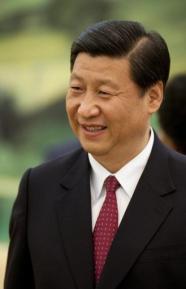 Cementing his helicopter ascent to succeed Hu Jintao in 2012, Chinese state media announced the appointment of Xi Jinping, the country’s vice-president to become vice-chairman of the party’s Central Military Commission, where Mr. Hu currently serves as the commission’s chairman. The appointment was made on the last day of the four-day plenary meeting of the Communist Party’s Central Committee in Beijing.
Cementing his helicopter ascent to succeed Hu Jintao in 2012, Chinese state media announced the appointment of Xi Jinping, the country’s vice-president to become vice-chairman of the party’s Central Military Commission, where Mr. Hu currently serves as the commission’s chairman. The appointment was made on the last day of the four-day plenary meeting of the Communist Party’s Central Committee in Beijing.
During the past four days, the 17th CPC Central Committee approved a new five-year blueprint for political reform, economic and social development. ratifying the 12th five-year plan (2011-15) and calling the 2011-15 period a “critical stage for China to build a moderately prosperous society in an all-around way,” saying the nation is “faced with both precious historic opportunities and plenty of foreseeable and unforeseeable risks and challenges.”
While details of the agreed communique are just coming to light for those outside the CPC, it is clear that China sees the next five years as important to laying the foundation for the next 40 years, the challenge though will be to maintain the balance between social and economic growth – a lesson they could learn from India. While China already recognises the problem of growing old before it grows rich, the nation is already taking steps towards a more inclusive growth. In March this year, Premier Wen Jiabao, addressing the 3,000 delegates of the National People’s Congress, stressed on shifting funds from infrastructure and development to social security in order to rebalance the economy.
In the coming years, the Chinese economy is forecast to grow by about 50 percent to US$7.5 trillion, powering past Japan and moving closer to the world’s biggest economy, the United States. Having powered through on an export led growth, the nation now plans to focus on domestic demand. According to National Development and Reform Commission director Zhang Ping, changes needed to secure growth included the further freeing up of resource prices, raising welfare spending to encourage citizens to spend more, increasing the income of ordinary workers and providing cheaper housing.
In tune with the reforms, the communiqué also said that the share of personal income, as part of the distribution of national income, should be increased, as should the quality of basic public services in the following five years. The document also calls for strengthening the social security system as well as accelerated reform and development of the healthcare sector.
